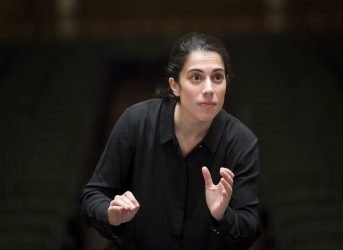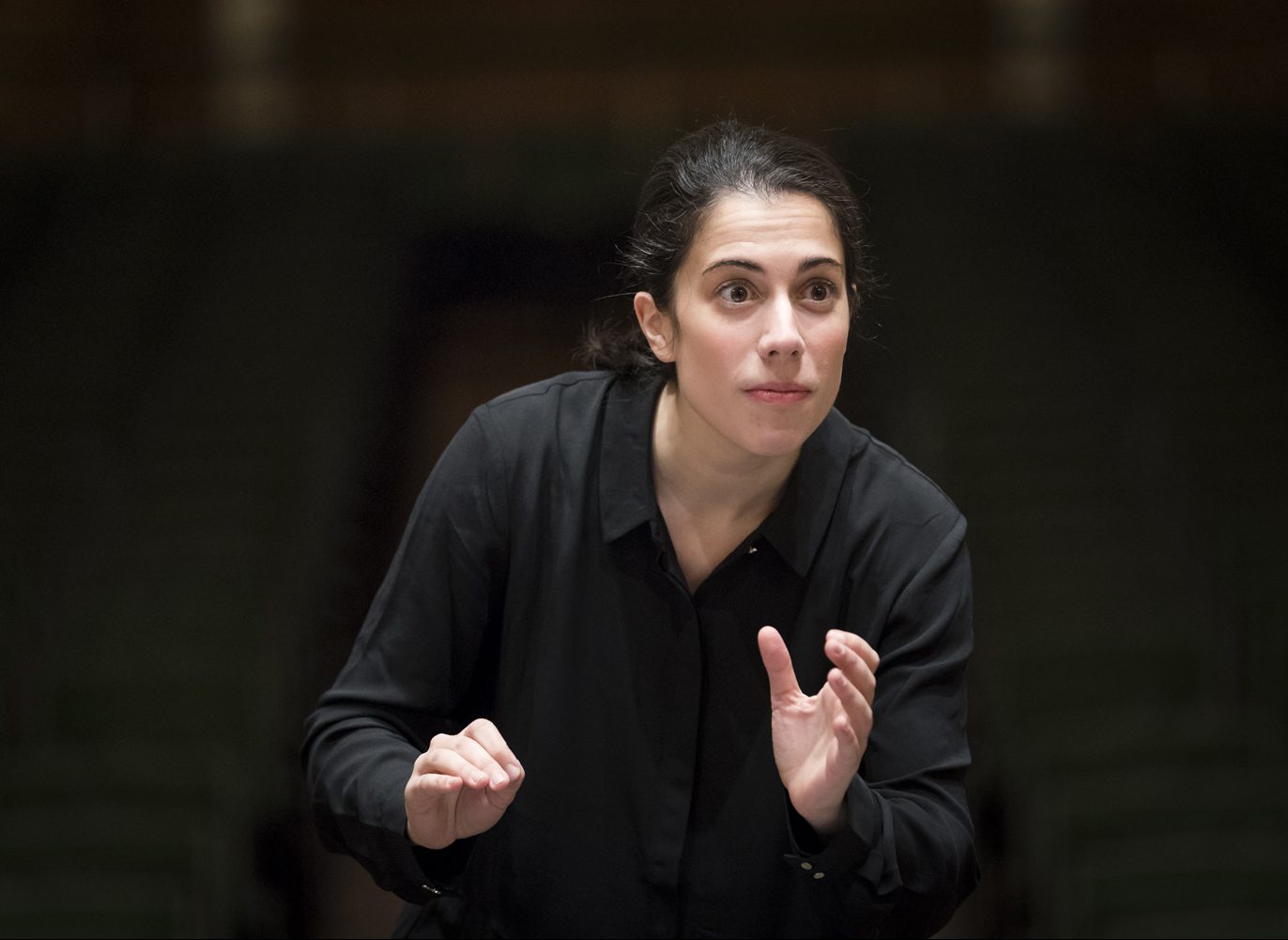
 Germany ‘The Golden Twenties’ – Eisler, Weill: Kolja Blacher (violin), Scholars of the Karajan Academy / Marie Jacquot (conductor), Livestreamed via the Digital Concert Hall from the Philharmonie Berlin, 16.2.2021. (GT)
Germany ‘The Golden Twenties’ – Eisler, Weill: Kolja Blacher (violin), Scholars of the Karajan Academy / Marie Jacquot (conductor), Livestreamed via the Digital Concert Hall from the Philharmonie Berlin, 16.2.2021. (GT)

Eisler – Suite for Orchestra No.3, Op.26 ‘Kuhle Wampe’
Weill – Concert for Violin and Wind Orchestra, Op.12; Symphony No.2
This is the second of five concerts in the ‘The Golden Twenties’ online festival promoted by the Berliner Philharmonic: the first featured works by Weill and Stravinsky. An intriguing feature of this concert was to hear the future of the Berlin Philharmonic and German orchestral music. The Scholars of the Karajan Academy have their series of concerts during the concert season. Interestingly, before the concert began, we were shown archive footage from concerts of the twenties with conductors like Furtwängler, Walter, Klemperer, and Richard Strauss together with concert programmes of the period which displayed the excitingly modern repertoire performed by the Berlin Philharmonic at this time.
Hanns Eisler wrote the music for the film Kuhle Wampe (Empty Stomach) in 1932. The scenario depicts the poverty of a working class family in Berlin during the Great Depression, and despite popularity on release was banned by the Nazis. The screenplay was authored by Bertolt Brecht, one of many collaborations between the two Marxists. Eisler gathered four extracts from his film score for this ten-minute piece. The Präludium, opens with rude bursts on brass, loud thumps from the timpani, introducing a rapidly moving switch of ideas and dissonance all in the jazzy idiom of the era. In the Intermezzo, the mood is reflective on the muted trumpet, while the clarinet introduced parody, juxtaposed by a funereal air on the strings. The Rondo was bright in the woodwind before a rapid train-like propelling sound against cackling xylophone and the moaning saxophones brought a jazzy and circus-like parody emphasised by the plucky banjo in a constant juxtaposing of moods until high-pitched clarinets rapidly propelled the music to a finish. The final movement, Die Fabriken, alternating between fast then slow tempos, the brass invoke the then famous Eisler ‘Solidarity Song’ and it was taken up by the whole orchestra before the sudden end to this mercurially brilliant orchestral piece.
Kurt Weill’s Violin Concerto employs a similar chamber-sized orchestra with wind, percussion and minimal strings opening the Andante con moto, with a reflective theme in the woodwind, before the soloist Kolja Blacher entered into a more solemn dialogue, which was enhanced by a beautiful solo horn from Paula Ernesaks. The idiom was chirpy and jocular from the two clarinets and bassoons while throughout the first movement, Weill introduces the Latin chant ‘Dies irae’ in memory of his teacher Ferruccio Busoni who died when this concerto was being written. In the second movement Notturno, Blacher introduced an attractive idea accompanied by the xylophone, then was the Cadenza with a fine solo from Lorenz Jansky on the trumpet duetting with Blacher’s beautiful violin. In the Serenata, there was a gorgeous solo from Alberto Acuña Almela on the flute and another idea in the superb horn playing from Haeree Yoo before the movement died away. The finale, Allegro molto, was upbeat switching quickly to a reflective passage, again the tempo quickened with some fantastic playing in the orchestra allowing every musician the opportunity to display their gifts.
In the interval talk, the French conductor Marie Jacquot spoke about her fascination with this music from the twenties, and about the important part both Weill and Eisler played in this period of change after the Great War. ‘Their music was highly rhythmic, and they were trying to escape from the romanticism in a “New Objectivity” breaking from expressionism of the past generations.’ About Weill’s Second Symphony, Jacquot said that ‘it contains many emotions, and the opening movement is like Beethoven’s Coriolanus Overture, while the second movement is like a procession with citations from opera, whilst the third movement offers hope at a time when Europe was being overrun by the Nazis.’
The Second Symphony employs a large orchestra and the first movement, Sostenuto – Allegro molto started dramatically on the strings with a trumpet solo from Jansky followed by a bracing idea in the whole orchestra. There were attractive opportunities for the young musicians to show their talents; Simon Degenkolbe on the clarinet, the horn of Ernesaks, and the oboe of Yijea Han were all allowed solos before the opening theme was reprised before the close. In the Largo, there were citations from opera, invoked by a beautiful cello solo from Sayaka Selina Studer. Then we heard the trombone of Jonathon Ramsay, leading to another quite rhapsodic idea on the strings followed by a melodramatic one, which was given momentum by Laura Melero Beviá on the timpani and supported on the brass. In the finale, Allegro vivace, the mood was buoyant, with delightful colour expressed on the clarinets and woodwind, and there’s bright optimism before the joyous climax.
This concert was interesting in presenting the future of the Berlin Philharmonic, already several of these musicians have played in the Philharmonic’s concerts, and on this basis, their future is promising should the music business return to the former level pre-pandemic. Since its foundation in 1971, Scholars of the Karajan Academy have found employment in the world’s finest orchestras. The conductor Marie Jacquot revealed herself as a very talented musician with a fine technique never exaggerating her gestures, and clearly in control of her musicians and the scores. She started studying trombone and conducting in Paris and continued her conducting studies in Weimar and Vienna and has a scholarship in the German Dirigentenforum. She was First Kapellmeister at the Mainfranken Theater in Würzburg and currently is First Kapellmeister at the Deutsche Oper am Rhein and works with orchestras in Düsseldorf and Duisburg. She has conducted extensively in Germany, Switzerland and Sweden in recent seasons, having previously worked with Kirill Petrenko at Bavarian State Opera as his assistant. Jacquot has conducted premieres of contemporary opera including Nikolaus Brass’s Die Vorübergehenden at the Munich Opera Festival in 2018. ‘The Golden Twenties’ online festival (click here) continues until 27 February when Christian Thielemann directs a concert of Busoni, Hindemith, and Richard Strauss.
Gregor Tassie
